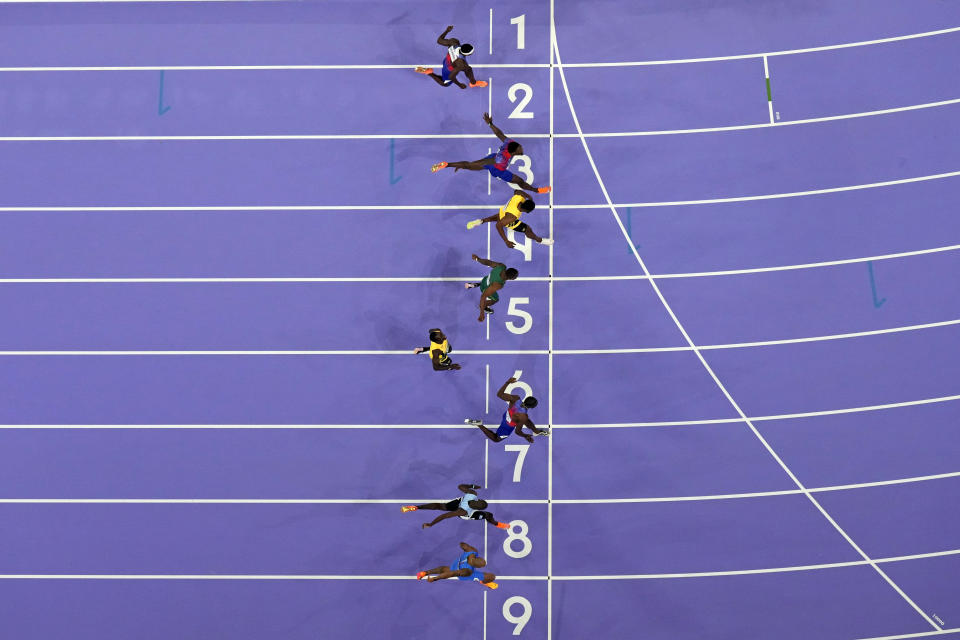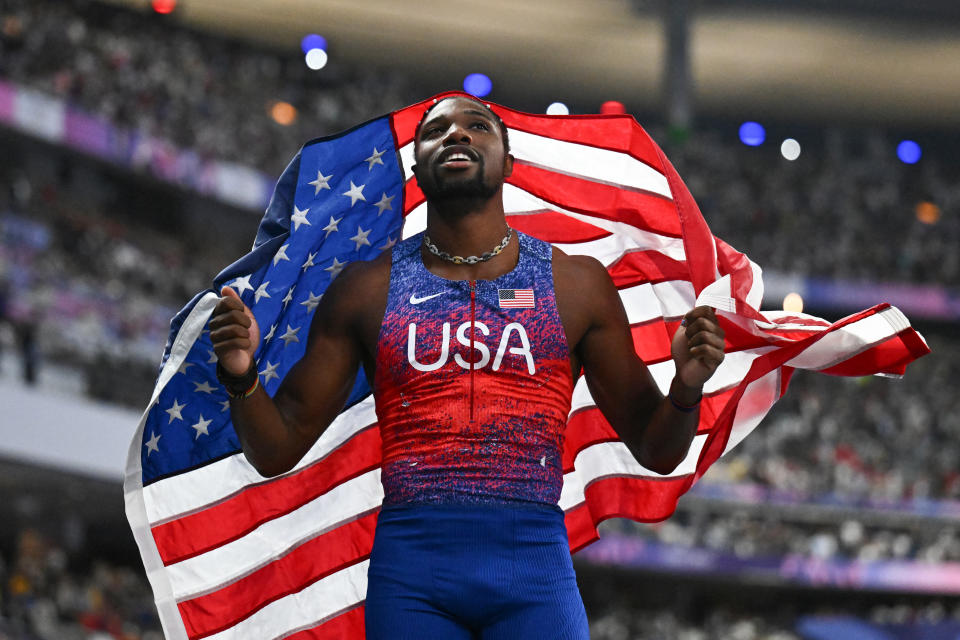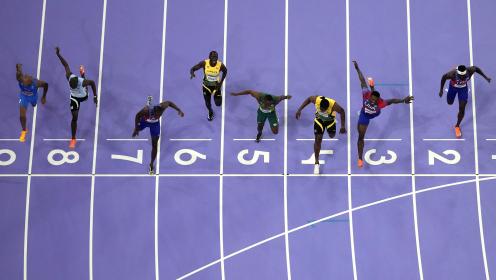
Medal table | Olympic schedule | How to watch | Olympic news
PARIS — For months, Noah Lyles has aggressively chased the spotlight. He invited Netflix cameras to trail him wherever he goes, strutted the runways of Milan and Paris and offered himself up as a guest on the late-night talk-show circuit.
Whenever a microphone or camera is nearby, Lyles hasn’t been shy about laying out his grandiose goals for the Paris Olympics. America’s fastest man has told anyone who will listen how he intends to eclipse the legendary Usain Bolt, how he hopes to capture four Olympic gold medals, how he’d like to return home a world-record holder.
“Now you’re going on the Mount Rushmore,” he recently explained to the “Tonight Show’s” Jimmy Fallon. “Now you’re the greatest of the great.”
The first chance for Lyles to back up his audacious talk finally arrived Sunday night when 80,000 roaring fans jammed into Stade de France to watch track and field’s glamor race. Lyles took his place alongside eight rivals for the Olympic 100-meter final. For someone, the title of world’s fastest man was just a sub-10-second sprint away.
Lyles, ever the showman, emerged from the Stade de France tunnel with white beads woven in his hair, nails decorated in red, white and blue. When introduced by the PA announcer, he ran 15 meters down the track, leaping up and down and urging the crowd to get louder.
After the starter’s gun sounded, Lyles burst out of the blocks surprisingly well and accelerated like his spikes were rocket-powered. He streaked down the track, leaned at the finish line and stared at the video board, waiting to see if he had done enough to win his first career Olympic gold medal.
He had … by scarcely more than a blink of an eye.
Lyles secured USA’s first gold medal in the men’s 100 in 20 years, streaking across the finish line in a personal-best 9.79 seconds. Jamaica’s Kishane Thompson finished second, five-thousandths of a second behind the American. Fred Kerley of the U.S. earned a bronze medal by running a season-best 9.81 seconds.
As they waited for the video board to reveal the winner, Thompson said Lyles told him, “Kishane, you got it.”
“Nah, I’m not sure,” the young Jamaican responded.
Thompson knew he cleared the runners on both sides of him, but he wasn’t sure about Lyles in lane 7.
“It was that close,” Thompson said.
As Lyles said earlier this summer at U.S. Olympic Trials, “I thrive off big moments. The bigger the moment, the faster I run.”
Lyles’ first Olympic gold medal is a big step toward him seeing a return on his conscious effort to go from Olympian to icon, from track-famous to famous-famous. To achieve mainstream status in his sport, the bar is impossibly high. It isn’t enough to have broken Michael Johnson’s American record in the 200 two years ago, nor to have pulled off the sprint treble at World Championships last August.
Lyles needed to excel in the one place that matters most to American viewers. Fair or not, Lyles has to follow in the footsteps of a Bolt, a Simone Biles, a Michael Phelps. He has to pile up gold medals, world records and heroic feats on an Olympic stage.
That Lyles summoned the speed to capture Olympic gold in the 100 is a massively encouraging sign for the rest of his Paris campaign. The 200 is Lyles’ specialty, his first love, the event that maximizes his talents. He holds his speed as well as any sprinter since Bolt, typically enabling him to swallow up anyone in front of him as he rounds the curve and streaks toward the finish line.
The 100 is Lyles’ “side chick,” as he has put it, the event that doesn’t come naturally to him but that he has worked tirelessly to master. Aware that he struggles to accelerate out of the blocks as quickly as other world-class sprinters, Lyles has tinkered endlessly with his start. The mission has been to find a way to remain in contact at 30 meters without sacrificing Lyles’ ability to reach maximum speed and sustain it.


In his 100 prelim on Saturday morning, Lyles started sluggishly and had to dig just to rally for second place behind reigning NCAA champion Louie Hinchcliffe of Great Britain. He claimed that he expected the rest of the field to “fall in line” behind him and that he wouldn’t make the mistake of underestimating his adversaries again.
“What time do you think you have to run to win the gold medal?” a reporter asked.
“I don’t know, but I’m going to run it,” Lyles deadpanned.
Lyles ran faster in Sunday night’s first semifinal, but again he crossed the finish line in second place. Jamaica’s Oblique Seville ran a personal best 9.81 seconds and edged Lyles by two-hundredths of a second, looking to his left at the American at the end of the race as if to say, “Where are you?”
Three years ago, during the last Olympic cycle, Lyles proved unready to seize his moment. Maybe it was the lack of crowds to draw energy from during COVID times. Maybe it was an ill-timed knee injury that interrupted his training. Maybe it was something else.
Whatever the reason, Lyles failed to qualify for Tokyo in the 100. Then he settled for a bronze in his signature 200 when Canada’s Andre De Grasse and fellow American Kenny Bednarek overtook him late in the Olympic final.
Lyles called his bronze medal “boring” in Tokyo. At U.S. Olympic Trials earlier this summer, he said the sight of it motivates him.
“I’ll be like, ‘Yeah, I think I’m doing enough,” Lyles said. “Then I turn around and look at the medal — ‘All right, back to work.’”
After backing up his big talk, Lyles at last has the Olympic gold medal that he craved.

